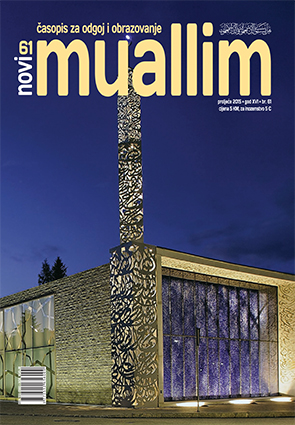ISLAMIC THEOLOGY AT GERMAN UNIVERSITIES; GENESIS, EXPECTATIONS AND PERSPECTIVES
DOI:
https://doi.org/10.26340/muallim.v16i61.166Keywords:
Islamic theology, German universities, Muslim communities in Germany, German publicAbstract
UDK 28-42(430)
Islamic theology is the youngest scientific discipline at German universities, which in the last five years has experienced dynamic development and yet it still remains an arena of different expecta-tions, debates and controversies which have been evolving around it since the mere announcement of its establishment. The process of developing Islamic theology takes place under the watchful eye of numerous segments of German society including Muslim protagonists and religious communities. Still, the attention focused on this discipline and the public debates around it do not give an authentic picture either of the current level of development, or its needs and problems. The mechanisms through which this public discourse on Islamic theology is taking place are often defined by external expectations, interests and projections that differ from protagonist to protagonist, all of whom share a lack of familiar-ity with the difficulties and challenges this discipline is facing. These challenges result from several factors including structural frameworks, the legal situation and the legal grounding of theol-ogy as a discipline in the environment of a secular university and its scientific frameworks. There are also still the burning issues of self-definition, or how to determine the epistemology and con-tent of this science, as well as how to determine its terminology. Another burning issue is the theoretical grounding of Islamic theology as a discipline that refers to the full range of intellectual and educational traditions of Islam, in all its heterogeneity and its different cultural and intellectual articulations, and which, at the same time, as an academic discipline within a university frame-work, partakes equally and through active communication with other contemporary sciences in an open movement of pursuing scientific cognition.
Downloads
Published
How to Cite
Issue
Section
License
Naknada:
a. Časopis ne naplaćuje naknadu za obradu članaka (APC) i naknadu za podnošenje članaka.
Autori koji objavljuju u ovom časopisu pristaju na sljedeće uvijete:
- Autori zadržavaju autorska prava i pružaju časopisu pravo prvog objavljivanja, pri čemu će rad jednu godinu po objavljivanju biti podložan licenci Creative Commons imenovanje koja omogućuje drugima da dijele rad uz uvijet navođenja autorstva i izvornog objavljivanja u ovom časopisu.
- Autori mogu izraditi zasebne, ugovorne aranžmane za ne-ekskluzivnu distribuciju rada objavljenog u časopisu (npr. postavljanje u institucionalni repozitorij ili objavljivanje u knjizi), uz navođenje da je rad izvorno objavljen u ovom časopisu.


